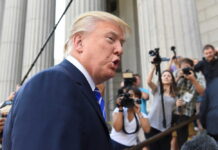
Trump trials are mounting up.
Last Friday, Trump entered a not-guilty plea to four conspiracy counts stemming from his plans to maintain power beyond the 2020 election, including the assault on the Capitol on January 6, 2021.
The prosecution has proposed starting Donald Trump’s criminal trial on January 2.
With fewer than two weeks before the Iowa caucuses, the team led by Special Counsel Jack Smith estimates that it will need four to six weeks to prepare its case. U.S. District Judge Tanya Chutkan, who presides over the case in federal court in Washington, D.C., was informed of the trial date in a brief.
Trump’s legal team has proposed waiting until after the 2024 election to start the trial over his alleged concealment of sensitive and classified material. Aileen Cannon, the judge presiding over the case, has set a trial date of May 20 instead.
There is a fair probability that a presumed Republican contender will have emerged by July when the party convention is scheduled to take place.
Smith asked for his trial to be moved up quickly. On December 11, jury selection is set to begin.
According to the prosecution, the timeframe will give the defense about five months to go through the discovery. The government believes the discovery will be mostly complete when the case is heard in court on August 28, 2023.
According to Smith’s legal team, this schedule is consistent with the public’s right to a speedy trial, protected by the Constitution and federal law. The proposed timeline, they say, would provide Trump’s legal team enough time to prepare.
After Smith’s legal team voiced fear that Trump would publicly disclose information learned via discovery or grand jury testimony, Judge Chutkan set a hearing for this coming Friday to discuss granting a protective order. The former president’s lawyers say the protective order should be narrowed to include “sensitive” information simply.
Trump is not obligated to show up to the trial.
John Lauro, Trump’s attorney, said that a fast trial was only in the defendant’s best interest, but prosecutors disagreed. They maintain that the public, not only the criminal, has a right to a speedy trial, as guaranteed by the Speedy Trial Act and the Speedy Trial Clause of the Sixth Amendment.
Prosecutors said this case’s trial involves matters of great public interest and should go quickly.














